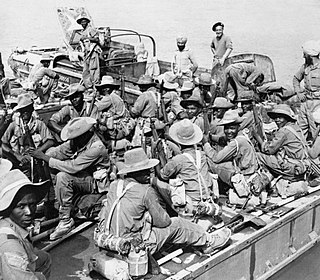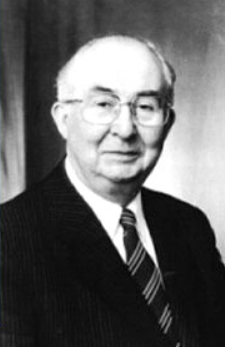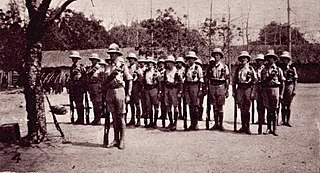
John Nkologo Chilembwe was a Baptist pastor, educator and revolutionary who trained as a minister in the United States, returning to Nyasaland in 1901. He was an early figure in the resistance to colonialism in Nyasaland (Malawi), opposing both the treatment of Africans working in agriculture on European-owned plantations and the colonial government's failure to promote the social and political advancement of Africans. Soon after the outbreak of the First World War, Chilembwe organised an unsuccessful armed uprising against colonial rule. Today, Chilembwe is celebrated as a hero of independence, and John Chilembwe Day is observed annually on 15 January in Malawi.

The Chilembwe uprising was a rebellion against British colonial rule in Nyasaland which took place in January 1915. It was led by John Chilembwe, an American-educated Baptist minister. Based around his Church in the village of Mbombwe in the south-east of the protectorate, the leaders of the revolt were mainly from an emerging black middle class. They were motivated by grievances against the colonial system including forced labour, racial discrimination, and new demands imposed on the indigenous population following the outbreak of World War I.
Joseph Booth was an English missionary working in British Central Africa and South Africa. In his 30s, Booth abandoned his career as a businessman and, for the rest of his life, he undertook missionary work for several Christian denominations including Baptist, Seventh Day Baptist and Seventh-day Adventist churches, and he was appointed a missionary by the Watch Tower Bible and Tract Society of Pennsylvania. Throughout his successive ministries, his defining beliefs were a radical egalitarianism, including a scheme of "Africa for the Africans"’ and, from 1898, Seventh-Day Sabbath (Sabbatarian) observance.
The Bussa rebellion, also known as the Boussa rebellion, was a small insurrection in the town of Bussa against the policy of indirect rule in British-ruled Nigeria in June 1915. The rebellion was triggered by the British deposition of the local Emir of Bussa, Kitoro Gani, and his replacement with a Native Administration. The rebels attacked and killed around half of the members of the Administration, while the rest fled, leaving the rebels in control in Bussa. Despite the ongoing Kamerun campaign against the German Empire, the British were able to use a small force of soldiers which quickly suppressed the rebellion incurring no casualties. The Bussa Rebellion was the subject of a major work by British historian Michael Crowder.

The African Theatre of the First World War comprises campaigns in North Africa instigated by the German and Ottoman empires, local rebellions against European colonial rule and Allied campaigns against the German colonies of Kamerun, Togoland, German South West Africa, and German East Africa. The campaigns were fought by German Schutztruppe, local resistance movements and forces of the British Empire, France, Italy, Belgium, and Portugal.
A. L. Bruce Estates was one of three largest owners of agricultural estates in colonial Nyasaland. Alexander Low Bruce, the son-in-law of David Livingstone, acquired a large estate at Magomero in the Shire Highlands of Nyasaland in 1893, together with two smaller ones. On his death, these estates were to operate as a trust to bring Christianity and Commerce to Central Africa. However his two sons later formed a commercial company which bought the estates from the trust. The company gained a reputation for the harsh exploitation and ill-treatment of its tenants under a labour system known by the African term "thangata", which operated in the plantation cultivation of cotton and tobacco. This exploitation was one of the causes of the 1915 uprising led by John Chilembwe, which resulted in the deaths of three of the company's European employees. After the failure of its own cotton and tobacco plantations, the company forced its tenants to grow tobacco rather than food on their own land and significantly underpaid them. Following almost three decades of losses, the Magomero estate was in poor condition, but the company was able to sell it at a profit between 1949 and 1952 because the government needed land for resettlement of African former tenants evicted from private estates. The company was liquidated in 1959.
William Jervis Livingstone (1865–1915) was the manager of the Magomero Estate in Nyasaland owned by A L Bruce Estates Ltd and was killed in 1915 during the uprising against colonial rule led by John Chilembwe. Livingstone, from the Isle of Lismore in Argyllshire, Scotland, was born in 1865 and appointed as manager of Magomero in 1893.
Alexander Livingstone Bruce was a capitalist of Scottish origin, a director and major shareholder of A L Bruce Estates Ltd, one of the largest property owning companies in colonial Nyasaland. His father, Alexander Low Bruce, was a son-in-law of David Livingstone and urged his two sons to use the landholding he had acquired for philanthropic purposes. However, during over 40 years residence in Africa, Bruce represented the interests of European landowners and opposed the political, educational and social advancement of Africans. After the death of his elder brother in 1915, Alexander Livingstone Bruce had sole control of the company estates: his management was harsh and exploitative, and one of the main causes of the uprising of John Chilembwe in 1915. During the uprising, three of Bruce's European employees were killed and one of them, William Jervis Livingstone was held partly to blame for the revolt. Although Livingstone was carrying out Bruce's orders, Bruce, as a leading landowner and member of the governor's Legislative Council, escaped censure. Despite Bruce's striving for profits, A L Bruce Estates lost money but was saved from insolvency by the colonial government's need for land for resettlement following a famine in 1949. Shortly before his death in 1954, Bruce was able to sell the company's Nyasaland estates, repay its debts and realise a surplus.

The involvement of the Nyasaland Protectorate in World War II began with the declaration of war on Nazi Germany by the British Empire in September 1939. Though no combat occurred in Nyasaland itself, it remained an economic asset for the Allies and also contributed a significant number of soldiers to fight in the British Army.
Operation Sunrise was the name given to a police and military action conducted by the authorities in the Central African protectorate of Nyasaland which started on 3 March 1959, initially to detain and intern 350 individuals who were considered a potential threat to law and order in anticipation of the declaration of a State of Emergency. Although it is sometimes considered to involve only the incidents of 3 March, the Devlin Commission report is clear that it was one of two distinct operations by the security forces, reinforced from outside Nyasaland, involving the arrest and detention members of the Nyasaland African Congress. It involved not only those members of Congress initially arrested, but others arrested and detained without trial in the course of the emergency. The operation was described in some detail in the Devlin Commission report and that account has been amplified by Colonial Office documents not made available to the Devlin Commission.
George Simeon Mwase was a government clerk and later businessman and politician in colonial Nyasaland. He became politically active in the 1920s under the influence of the ideas of Marcus Garvey and his "Africa for the Africans" movement, and was instrumental in founding the Central Province Native Association in 1927. Mwase joined the Nyasaland African Congress (NAC) in 1944, soon after its formation, and later participated in its executive. By the late 1950s, the gradualism of Mwase and many of his contemporaries was rejected by a younger generation of more radical NAC members. He was marginalised and left the NAC and became a supporter of the Federation of Rhodesia and Nyasaland.
Charles Vincente Domingo was born in Mozambique but spent most of his life in northern Nyasaland, where he was educated at the Free Church of Scotland (1843-1900) mission at Livingstonia. He later became a teacher and licensed preacher there, but left the Free Church in 1908 over delays to his ordination and he later established an independent Seventh Day Baptist church and school in the Mzimba district. Domingo was one of three Africans sponsored by Joseph Booth who created independent churches in Nyasaland in the early 20th century, the others being John Chilembwe and Elliot Kamwana. Domingo did not favour armed revolt, as Chilembwe did, nor was he a charismatic preacher seeking rapid social change like Kamwana. He was a moderate social reformer who strongly criticised the inequalities of colonial rule, and a teacher who believed that Africans should run their own churches free of external supervision and use these churches to promote a high standard of education to create a cultured African elite, which would undertake its own social and political advancement. He failed because of inadequate resources in the poverty-stricken north of Nyasaland and through government suspicion of his motives, but he remains one of the pioneers of Malawi’s independence.
Landon Napoleon Cheek was an African-American Baptist missionary who served in the British Central Africa Protectorate, later renamed Nyasaland, between 1901 and 1906. There, he assisted John Chilembwe, the founder of the Providence Industrial Mission during the church's formative period. After returning to the United States, he became a Baptist pastor for almost 50 years. Cheek died in Chicago in 1964.
The Livingstone Bruce Plantation Raid was an attack on the European owned and run cotton and tobacco plantation, which was situated at Magomero. The attack on the plantation was only major action of the ill fated Chilembwe uprising.
The Blantyre Raid was an attack carried out by the rebel leader John Chilembwe and his followers on the African Lakes Company depot in Blantyre on 24 February 1915. The rebels failed to capture the depot, although they were able to seize a small number of rifles from the depot.
The Nyasaland emergency of 1959 was a state of emergency in the protectorate of Nyasaland, which was declared by its governor, Sir Robert Armitage, on 3 March 1959 and which ended on 16 June 1960. Under the emergency powers that operated during the Emergency, over 1,300 members or supporters of the Nyasaland African Congress (Congress) were detained without trial, and most of the party's leaders including its president, Dr. Hastings Banda, were imprisoned in Southern Rhodesia after being arrested on 3 March. Many other Africans were jailed for offences related to the Emergency, including rioting and criminal damage. In the week before the Emergency was declared and during its first month, over 50 Africans were killed and many more wounded by the colonial security forces, which included many European troops from Southern Rhodesia. Others were beaten by troops or armed police or had their huts destroyed and their property seized during punitive operations undertaken during the Emergency.

The ideas, people and events that contributed to John Chilembwe's motivation and influenced him to undertake the uprising in 1915 were considered by the Commission of Inquiry shortly after the rising was defeated, and have exercised historians of Malawi during much of the period since his death. Whether the dominant ideas were political, social, economic or religious and how these combined is unclear, because Chilembwe did not leave a detailed record of the reasons for his armed revolt. As he was an ordained Baptist minister, much attention has focussed on his religious ideas, whether these were orthodox or related to millennialism, the extent to which such potentially conflicting religious ideas existed, particularly in the period shortly before the rising, and the part that such beliefs played in the decision to revolt and the course of the uprising.

George "Sam" Albert Shepperson was a British historian and Africanist, noted particularly for his work on Malawian and African-American history. He was William Robertson Professor of Commonwealth and American History at the University of Edinburgh from 1963 until 1986. He was named Commander of the Order of the British Empire in 1989.

The Nyasaland Volunteer Reserve (NVR) was a reserve infantry unit in the British protectorate of Nyasaland. The British Central Africa Volunteer Reserve was formally established by the colonial government in 1901 and was renamed when the protectorate became Nyasaland in 1907. In the initial years the unit was little more than a rifle shooting club with no uniform and no military training. The NVR was placed on a more formal standing in 1908 under the Volunteer Ordinance. This implemented residency and racial requirements for membership and made provision for the unit to be mobilised by the governor. The unit was initially formed of four sections but grew to seven sections by 1914 and by 1930 the unit had ten.








